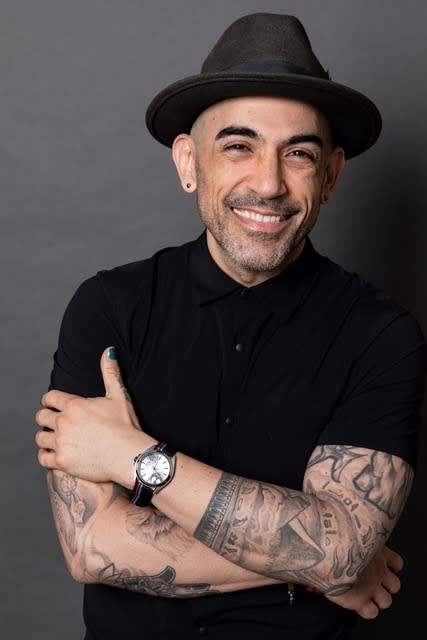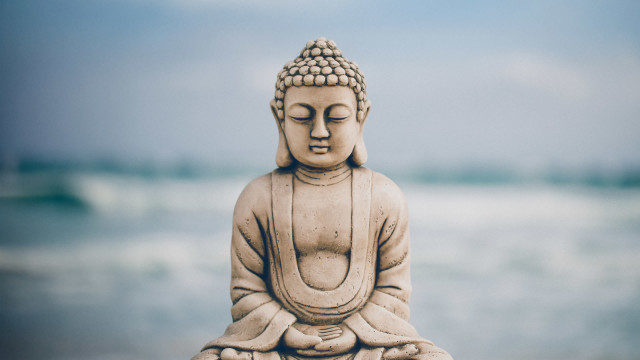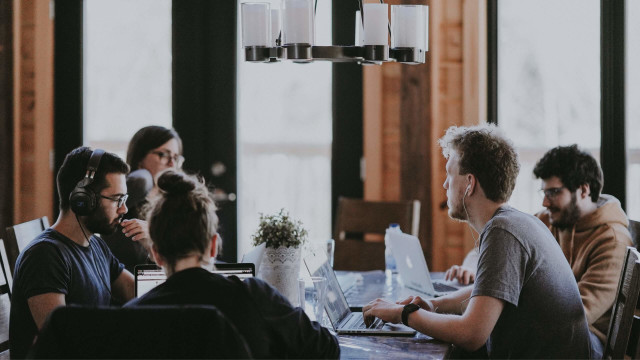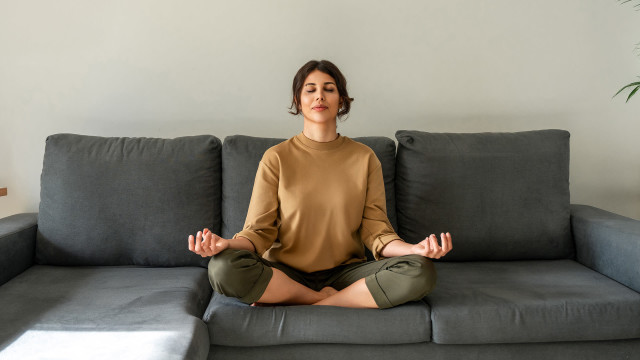Emotional Sobriety Through Meditation

After a childhood filled with trauma, Ceasar Barajas didn’t have the coping skills to deal with the day-to-day realities of life. Once he found meditation, it changed everything. And while that doesn’t mean life is a cake walk now, he does have the tools needed to get through it with grace. Here, Barajas talks finding his own meditation style, using emotions constructively, and why you should be sure to treat yo’self.
Q: How did you first discover meditation?
A: In 2010, I was post-divorce. My marriage fell apart because of a series of events, but I essentially became a danger to myself and my ex-wife. I reached out to an employee assistance program at the Trader Joe’s that I happened to be working at, and was introduced to a therapist for the first time in my life. That very first therapist introduced me to meditation, affirmation, mantras — a series of modalities that help people wholistically — along with people like Louise Hay and Wayne Dyer. From him I learned what Reiki is, what energy healing is. It’s been 10 years of therapy, counseling, and exploration. I tell people that’s when I found my emotional sobriety — essentially the path that I’m on now started then. My emotional sobriety over the last decade has been up and down, and I’m just fortunate that I’m in this position now to help people and educate them.
Q: How did you find your meditation style, and why does it work so well for you?
A: Between 2010 and 2015, I was told that meditation is sitting perfectly still, legs crossed. I tried as often as I could to sit in lotus, and it doesn’t work well for me; it’s not even comfortable for my physical body. I am lucky because I was living in Los Angeles then, and I would often go to the beach to surf, where I discovered that moving meditation is what resonates with me. In 2015, I became an ambassador and master teacher for Veterans Yoga Project, an organization founded in 2010 to help veterans, active-duty reservists, and their families, and there I learned and got continuing education credits in mindful resilience for trauma recovery and compassion fatigue.
I started to learn the basics — the science and physiology — of why breathwork is important. We are in a chemical-dependent Western world, and we often do not encourage people to look within their inner equilibrium and their own breathwork to help alter and possibly cure ailments, stresses, anxieties, and depressions. I then fused everything that I learned — Vipassana and metta and loving kindness and moving meditation — and I often encourage people to develop their own thing. If you want to lay down, lay down; if you want to plug me in your ear and run some errands, do that. It’s about encouraging people to find what’s going to work for them. I am not a fan of teachers saying, “This is the way that it’s done,” because it isn’t. It’s been a practice that dates back thousands of years that has developed and shifted and morphed, and the essence of it is allowing people to find their own mechanisms so they can develop what style holistically works for them.

Q: Who’s had the biggest impact on your work?
A: Thich Nhat Hanh, Pema Chodron, and my father. My whole life, he has been one of the coolest cats on the planet. In any situation that comes up where everyone’s freaking out, my dad is just chill; he’s cooler than the other side of a pillow. I love that because my father’s a Mexican immigrant, and there’s this incredible work ethic, so he’s always been moving, always been working, and he’s incredibly skilled at so many different things.
Q: What are the greatest benefits you’ve received from meditating?
A: I will — hands down, honest-to-goodness truth — tell you that meditation has saved my life. I grew up troubled, and that turned me into a very, very angry young man. Once I realized that I could stop and take a breath, I then was able to realize I’m in a better position to respond to situations when I don’t let anger or aggression or stress lead the way. Once you feel anything emotionally, it’s either going to be constructive or destructive, and what we don’t realize is that we have the choice. We will often succumb to the destructive side of how our emotions carry us, not realizing that we can pause.
I’m not telling you to not handle the situation, I’m not telling you to not be mad, I’m not telling you to not forgive this person — what I’m saying to you is take a second and then put yourself in a safer, more sound position to be able to better handle a hindrance, an obstacle, a failure, blockages, stress, triggers, all of that stuff.
Q: Other than meditation, what daily tools do you use to feel your best?
A: Yoga every darn day. I’ve been practicing yoga 20 years now. Coming from a professional dancer background, I used yoga religiously to warm up and cool down. I also try to treat myself once every day, whether that’s a giant cookie or an episode of my favorite show. This summer, I took up running, and I’ll go for three or four miles. So, running, yoga, and treat yo’self — have the desserts!
Header photo: Aziz Acharki/Unsplash
Key Takeaways:
- Meditation can teach us coping skills to face challenges.
- Learn the science and physiology behind the practice.









